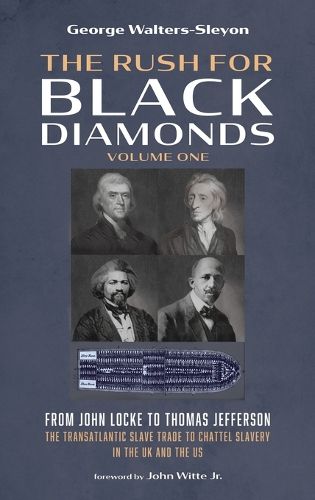Readings Newsletter
Become a Readings Member to make your shopping experience even easier.
Sign in or sign up for free!
You’re not far away from qualifying for FREE standard shipping within Australia
You’ve qualified for FREE standard shipping within Australia
The cart is loading…






The Rush for Black Diamonds, Volume One is the first of two volumes. It explores the Transatlantic slave trade and its mutation into chattel slavery. Volume One focuses on the involvement of two prominent Enlightenment philosophers as the architects of the political, legal, economic, and philosophical justifications for the human trade in the United Kingdom and the United States: John Locke (1632-1704), a British philosopher and "Father of Liberalism"; and Thomas Jefferson (1743-1826), the third president of the United States. Both men, Locke and Jefferson, were also slave traders and slave masters. Referring to Lockean Slavery and Jeffersonian Slavery, The Rush for Black Diamonds, Volume One contends that Locke and Jefferson are responsible for the justification and sustainability of chattel slavery and its post-slavery racial perceptions and marginalization of Black people in the West. Used as a metaphor, Black Diamonds captures the exploration of Western nations' rush for Black people across the Atlantic Ocean to be used as economic units and chattel property. With impunity, it was the most disruptive act of human institutions, cultures, and socioeconomic and political stability, with substantial financial, social, political, and racial implications for centuries in human history.
$9.00 standard shipping within Australia
FREE standard shipping within Australia for orders over $100.00
Express & International shipping calculated at checkout
The Rush for Black Diamonds, Volume One is the first of two volumes. It explores the Transatlantic slave trade and its mutation into chattel slavery. Volume One focuses on the involvement of two prominent Enlightenment philosophers as the architects of the political, legal, economic, and philosophical justifications for the human trade in the United Kingdom and the United States: John Locke (1632-1704), a British philosopher and "Father of Liberalism"; and Thomas Jefferson (1743-1826), the third president of the United States. Both men, Locke and Jefferson, were also slave traders and slave masters. Referring to Lockean Slavery and Jeffersonian Slavery, The Rush for Black Diamonds, Volume One contends that Locke and Jefferson are responsible for the justification and sustainability of chattel slavery and its post-slavery racial perceptions and marginalization of Black people in the West. Used as a metaphor, Black Diamonds captures the exploration of Western nations' rush for Black people across the Atlantic Ocean to be used as economic units and chattel property. With impunity, it was the most disruptive act of human institutions, cultures, and socioeconomic and political stability, with substantial financial, social, political, and racial implications for centuries in human history.